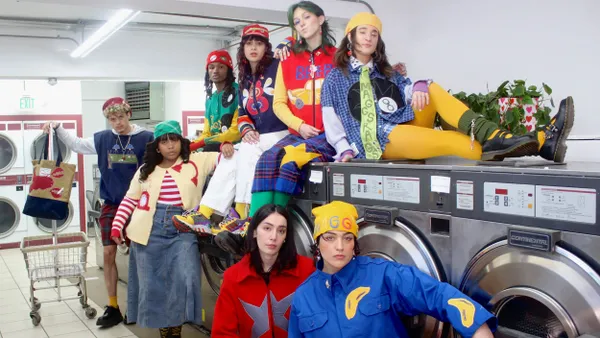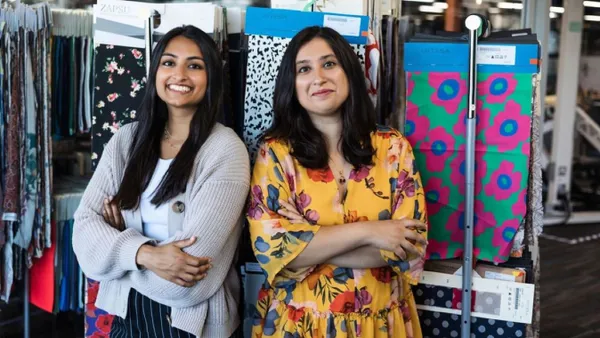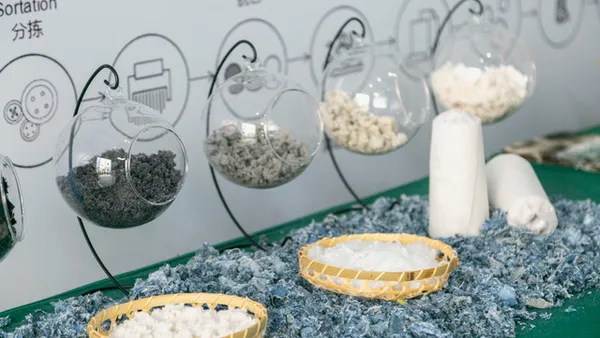Dive Brief:
- Guess, Inc. released its FY 2022-2023 ESG report last week, outlining the company’s plans to expand sustainability initiatives, decrease emissions and expand programs supporting women, wellness and diversity.
- The California-based denim company wants to introduce or increase its repair, resale, and upcycling initiatives by 2025, as well as develop a strategy addressing circularity definitions and policies, which the report states it plans to support with its circular design product playbook. That playbook would be applied to one capsule per each season once implemented.
- Its primary and secondary product packaging and hangtags apparel and men’s bags is also slated to be made of materials that are both fully recycled and 100% recyclable by 2030.
Dive Insight:
This ESG report from Guess was also the company’s first “double materiality assessment,” conducted in order to “identify, update, and prioritize sustainability topics” as well as give the overall ESG strategy at Guess a refresh, according to a statement released in support of the report.
“Now more than ever, it is critical that we work with urgency to combat the far-reaching effects of the pandemic, the climate crisis and human rights issues across our world,” Carlos Alberini, CEO and director of Guess, said in the report. He added that the company anticipated heavier environmental regulations in terms of ESG practices, and that he expected there to be more focus on “transparency, integrity and accuracy in reporting ESG data” moving forward.
Meanwhile, Guess is also pledging that by 2025 it will work more with key suppliers to create training opportunities promoting positive change for women; expand wellness and mental health programming for all employees; maintain gender pay parity; and implement mandatory management training on harassment prevention in the workplace.
Since 2019’s fiscal year, Guess stated it’s been able to reduce Scope 1 greenhouse gas emissions, meaning direct emissions from sources owned or controlled by a reporting entity, by half. Scope 2 GHG emissions, meaning emissions indirectly generated from purchased energy such as electricity or heating, were also reduced by 50% as of 2023, based on the company’s FY 2019 baseline. It accomplished this, per the report, by making stores more energy-efficient and upping the use of renewable energy by purchasing renewable energy credits.
Yet Scope 3 emissions generally make up the bulk of a company’s footprint because they encompass all carbon emissions indirectly generated by a business, including travel, purchased goods and services, distribution and other services. In that arena, Guess said it was focused specifically on its apparel ‘Purchased Goods and Services’ emissions, and by that rubric it has committed to reducing Scope 3 emissions by 30% against its FY2019.
The company pledged to release “a more detailed and thoughtful strategy” regarding its GHG emissions in 2024.
“As we enter our 42nd year of business the world is changing and the climate crisis progressing, it becomes increasingly important for customers to not only feel confident in the clothes they wear, but to know that the clothes they buy are not contributing to the harm of our environment,” Paul Marciano, co-founder and chief creative officer, said in the report.
Guess began to work on its sustainability efforts in earnest a few years ago. In 2019, Guess launched an Eco line using environmentally conscious materials and manufacturing processes, which followed the company’s publication of its second sustainability report and its first sustainability plan in 2017.
The company has continued to produce capsules in this collection, and its recently launched “GUESS ECO Spring-Summer 2023” capsule features a “Feather Weight” fabric made from post-consumer cotton and recycled polyester fibers. The current season’s line also includes pieces made using eco-friendly fibers sourced from responsibly managed forests, upcycled cotton scraps; and organically grown cotton and hemp. On its website, Guess said all of the processes for this capsule are carried out in partnership with the Better Cotton initiative and closely monitored using software that enhances productivity and cuts down on harmful emissions, water and energy consumption.











